U.S. releases intel assessment of evidence on purported use of chemical weapons by Syria --- So now what?...
 Late last night we flagged the New York Times report claiming that "momentum for Western military strikes against Syria appeared to slow," following the UK Parliament's stunning vote to reject military intervention there, after Prime Minister David Cameron's government released a fairly thin intelligence assessment and a less-than-persuasive legal theory for taking such action.
Late last night we flagged the New York Times report claiming that "momentum for Western military strikes against Syria appeared to slow," following the UK Parliament's stunning vote to reject military intervention there, after Prime Minister David Cameron's government released a fairly thin intelligence assessment and a less-than-persuasive legal theory for taking such action.
Today, the U.S. released its own unclassified intelligence community assessment of what they describe as "high confidence" that the Syrian regime --- at least someone within it --- launched a large chemical weapons attack on neighborhoods near Damascus on August 21.
The attack, the assessment says, resulted in the death of 1,429 people, "including at least 426 children". According to the document, the "high confidence" assessment is "the strongest position that the U.S. Intelligence Community can take short of confirmation."
Along with the release of that assessment, U.S. Secretary of State John Kerry offered a very straightforward statement (worth reading in full). Please note, however, that the intel assessment, as well as Kerry's statement, did not include the actual first-hand evidence from which the intelligence community is making their assessment, only their evaluation and summary of that evidence. The Administration says they are sharing more of the actual, still-classified assessment and/or evidence with members of Congress.
Kerry noted during his remarks that the intelligence community has been "more than mindful of the Iraq experience," and promised, "We will not repeat that moment." He also added: "the American people are tired of war. Believe me, I am too. But fatigue does not absolve us of our responsibility."
For his part, the President, in a statement made just before a White House meeting this afternoon, announced that he has made no final decision on action in Syria, but is currently considering a "limited narrow act" which, he says, "in no way involves boots on the ground" or a "long term campaign."
While both Kerry's remarks and Obama's brief comments referenced "consultation" with Congress, neither noted either the legal or Constitutional requirement to receive authorization from them, as we called for earlier, before launching a military intervention, "limited", "narrow" or otherwise, other than in a case of "national emergency".
Both men did, however, offer the case that we must demonstrate the world means what it says about the use of chemical weapons, as banned by the Geneva Convention after WWI and again in various treaties in the nearly 100 years since then.
With all of that in mind --- and, for now, taking the U.S. intelligence assessment at face value for the purposes of this article --- the central point here seems to be that, while killing hundreds of thousands of innocent people with conventional weapons is, apparently, tolerable, using chemical weapons to kill some of them is a war crime. And war crimes, we are told, are a bridge too far.
Really?...
--- Click here for REST OF STORY!... ---


 A Pretty Weak 'Strongman': 'BradCast' 10/30/25
A Pretty Weak 'Strongman': 'BradCast' 10/30/25 'Green News Report' 10/30/25
'Green News Report' 10/30/25
 Proposal for 'First Politically Viable Wealth Tax' Takes Shape in CA: 'BradCast' 10/29/25
Proposal for 'First Politically Viable Wealth Tax' Takes Shape in CA: 'BradCast' 10/29/25 Monster Storm, Endless Wars, Gamed Elections:
Monster Storm, Endless Wars, Gamed Elections: 'Green News Report' 10/28/25
'Green News Report' 10/28/25 Let's Play 'Who Wants
Let's Play 'Who Wants Sunday 'Cartoonists Dilemma' Toons
Sunday 'Cartoonists Dilemma' Toons Exiled NOAA Scientists Resurrect Critical Disaster Database: 'BradCast' 10/23/25
Exiled NOAA Scientists Resurrect Critical Disaster Database: 'BradCast' 10/23/25  'Green News Report' 10/23/25
'Green News Report' 10/23/25 Trump-Allied GOP Partisan Buys Dominion Voting Systems: 'BradCast' 10/22/25
Trump-Allied GOP Partisan Buys Dominion Voting Systems: 'BradCast' 10/22/25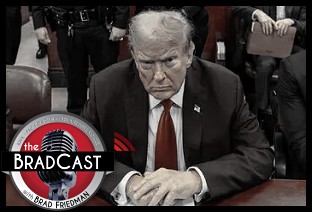 Trump, Republican Law(lessness) & (Dis)Order: 'BradCast' 10/21/25
Trump, Republican Law(lessness) & (Dis)Order: 'BradCast' 10/21/25 'Green News Report' 10/21/25
'Green News Report' 10/21/25 Celebrating 'No Kings': 'BradCast' 10/20/25
Celebrating 'No Kings': 'BradCast' 10/20/25 Sunday 'How It Started' Toons
Sunday 'How It Started' Toons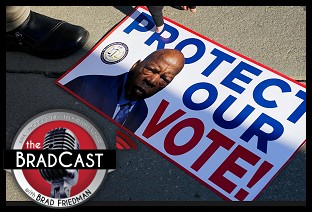 SCOTUS Repubs Appear Ready to Gut Rest of Voting Rights Act: 'BradCast' 10/16/25
SCOTUS Repubs Appear Ready to Gut Rest of Voting Rights Act: 'BradCast' 10/16/25 'Green News Report' 10/16/25
'Green News Report' 10/16/25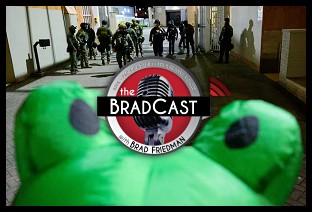 The 'Epstein Shutdown' and Other Autocratic Nightmares: 'BradCast' 10/15/25
The 'Epstein Shutdown' and Other Autocratic Nightmares: 'BradCast' 10/15/25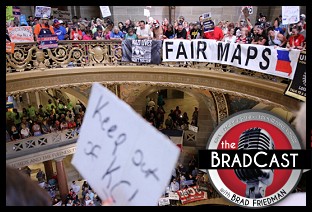 Group Vows to Block MO's GOP U.S. House Gerrymander: 'BradCast' 10/14/25
Group Vows to Block MO's GOP U.S. House Gerrymander: 'BradCast' 10/14/25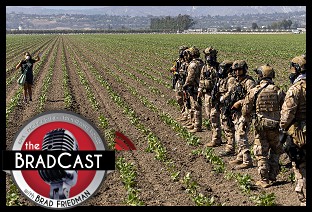 Trump Labor Dept. Warns Trump Policies Sparking Food Crisis: 'BradCast' 10/9/25
Trump Labor Dept. Warns Trump Policies Sparking Food Crisis: 'BradCast' 10/9/25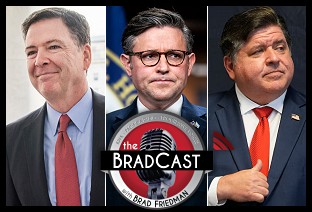 Trump's Losing Battles: 'BradCast' 10/8/25
Trump's Losing Battles: 'BradCast' 10/8/25 Trump, Roberts and His Stacked, Packed and Captured SCOTUS: 'BradCast' 10/7/25
Trump, Roberts and His Stacked, Packed and Captured SCOTUS: 'BradCast' 10/7/25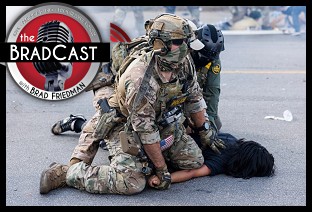 Trump Attempting His 'Invasion from Within': 'BradCast' 10/6/25
Trump Attempting His 'Invasion from Within': 'BradCast' 10/6/25 Biden Budget Expert: Mass Firings in Shutdown 'Illegal': 'BradCast' 10/2/25
Biden Budget Expert: Mass Firings in Shutdown 'Illegal': 'BradCast' 10/2/25 Why is DOJ Suing 'Blue' States for Their Voter Databases?: 'BradCast' 10/1/25
Why is DOJ Suing 'Blue' States for Their Voter Databases?: 'BradCast' 10/1/25
 VA GOP VOTER REG FRAUDSTER OFF HOOK
VA GOP VOTER REG FRAUDSTER OFF HOOK Criminal GOP Voter Registration Fraud Probe Expanding in VA
Criminal GOP Voter Registration Fraud Probe Expanding in VA DOJ PROBE SOUGHT AFTER VA ARREST
DOJ PROBE SOUGHT AFTER VA ARREST Arrest in VA: GOP Voter Reg Scandal Widens
Arrest in VA: GOP Voter Reg Scandal Widens ALL TOGETHER: ROVE, SPROUL, KOCHS, RNC
ALL TOGETHER: ROVE, SPROUL, KOCHS, RNC LATimes: RNC's 'Fired' Sproul Working for Repubs in 'as Many as 30 States'
LATimes: RNC's 'Fired' Sproul Working for Repubs in 'as Many as 30 States' 'Fired' Sproul Group 'Cloned', Still Working for Republicans in At Least 10 States
'Fired' Sproul Group 'Cloned', Still Working for Republicans in At Least 10 States FINALLY: FOX ON GOP REG FRAUD SCANDAL
FINALLY: FOX ON GOP REG FRAUD SCANDAL COLORADO FOLLOWS FLORIDA WITH GOP CRIMINAL INVESTIGATION
COLORADO FOLLOWS FLORIDA WITH GOP CRIMINAL INVESTIGATION CRIMINAL PROBE LAUNCHED INTO GOP VOTER REGISTRATION FRAUD SCANDAL IN FL
CRIMINAL PROBE LAUNCHED INTO GOP VOTER REGISTRATION FRAUD SCANDAL IN FL Brad Breaks PA Photo ID & GOP Registration Fraud Scandal News on Hartmann TV
Brad Breaks PA Photo ID & GOP Registration Fraud Scandal News on Hartmann TV  CAUGHT ON TAPE: COORDINATED NATIONWIDE GOP VOTER REG SCAM
CAUGHT ON TAPE: COORDINATED NATIONWIDE GOP VOTER REG SCAM CRIMINAL ELECTION FRAUD COMPLAINT FILED AGAINST GOP 'FRAUD' FIRM
CRIMINAL ELECTION FRAUD COMPLAINT FILED AGAINST GOP 'FRAUD' FIRM RICK SCOTT GETS ROLLED IN GOP REGISTRATION FRAUD SCANDAL
RICK SCOTT GETS ROLLED IN GOP REGISTRATION FRAUD SCANDAL VIDEO: Brad Breaks GOP Reg Fraud Scandal on Hartmann TV
VIDEO: Brad Breaks GOP Reg Fraud Scandal on Hartmann TV RNC FIRES NATIONAL VOTER REGISTRATION FIRM FOR FRAUD
RNC FIRES NATIONAL VOTER REGISTRATION FIRM FOR FRAUD EXCLUSIVE: Intvw w/ FL Official Who First Discovered GOP Reg Fraud
EXCLUSIVE: Intvw w/ FL Official Who First Discovered GOP Reg Fraud GOP REGISTRATION FRAUD FOUND IN FL
GOP REGISTRATION FRAUD FOUND IN FL




























 I've never been particularly impressed with MSNBC's Krystal Ball. She's never come across to me as much more than a knee-jerk Democratic Party loyalist, willing to join too many others on the cable news net to offer various versions of the same predictable party line.
I've never been particularly impressed with MSNBC's Krystal Ball. She's never come across to me as much more than a knee-jerk Democratic Party loyalist, willing to join too many others on the cable news net to offer various versions of the same predictable party line.


 On the day after Secretary of State Colin Powell's infamous Feb. 5, 2003 U.N. presentation of inaccurate information concerning Iraqi WMD and alleged ties between Saddam Hussein and al Qaeda, a group of high-ranking, former intelligence agency veterans and whistleblowers calling themselves
On the day after Secretary of State Colin Powell's infamous Feb. 5, 2003 U.N. presentation of inaccurate information concerning Iraqi WMD and alleged ties between Saddam Hussein and al Qaeda, a group of high-ranking, former intelligence agency veterans and whistleblowers calling themselves  During last
During last  The bulk of today's BradCast on
The bulk of today's BradCast on 
 Late last night
Late last night 















